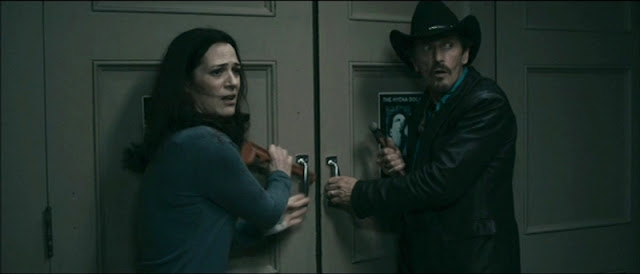(2008) Directed by Bruce McDonald; Written by Tony Burgess; Based on the novel Pontypool Changes Everything, by Tony Burgess; Starring: Stephen McHattie, Lisa Houle, Georgina Reilly and Hrant Alianak; Available on Blu-ray and DVD
Rating: ****
“I think that you want to start from a ridiculous place… You start from an enormous set of restrictions that are just impossible to deal with, and if you can make that succeed, then it’s only a matter of how big do you want to make it for that experience to be satisfying… The challenge is, we have to make everything work, a siege, the end of the world, enormous countries involved, and levels of media, all work in a six-by-six-inch space. If you can do that, from a writing perspective, and make it sort of have all these rhythms and paces and action… How much bigger do you have to go before an audience buys it – and don’t go bigger, because you’re gonna lose the tight knots of the original principle.” – Bruce McDonald (from DVD commentary)
Can words be weaponized? In elementary school we’re all taught that “sticks and stones will break my bones, but names will never hurt me.” Carrying that mindset to the fractious world of internet discourse, some individuals claim words only have power if we give them power (which seems a convenient excuse for oppressors to continue their verbal onslaught, while eschewing any semblance of accountability). But what if words could kill? Such is the premise of Pontypool, a zombie film like no other.
It’s a particularly miserable, blustery winter morning in the normally quiet rural community of Pontypool, Ontario. As talk radio DJ Grant Mazzy (Stephen McHattie) prepares for his shift at CLSY, something is awry during his morning drive. He stops to exchange words with a woman wandering in the snow, behaving erratically and gibbering, but she disappears almost as soon as she appears. It soon dawns on Mazzy that her behavior isn’t as anomalous as he suspected, but a symptom of a much larger problem. He begins the morning show amidst news reports of strange occurrences around town. While Mazzy and his co-workers try to make sense out of the senselessness, the situation outside the confines of their radio station becomes explosive, with reports of people turning into zombies compelled to kill. Their worst fears are confirmed when impromptu guest Dr. Mendez (Hrant Alianak), at once fascinated and terrified by the sudden progression of events, describes the epidemic as a disease.
Screenwriter Tony Burgess (who adapted his own novel) thought of the film’s title after driving through the unincorporated area of Pontypool. Intrigued with semiotics (how words symbolized abstractions and objects), Burgess latched onto the concept that the name “Pontypool” lent itself to distortion, with the word “typo” in the middle. The film’s disease is transmitted through specific words (or a specific combination), which carry a virus of sorts.* The infected brain sends the afflicted individual into endless loops, “seeking” the solace of others, in a misguided effort to purge the semantic demons inside. Unlike the mindless, half-dead, brain-eating sort of monsters depicted in most zombie movies, Pontypool’s zombies are emotional creatures – their distorted speech is a desperate cry for help.
* Fun Fact #1: Director Bruce McDonald described three
components of distorted communication, as it relates to a character in the film:
1) The thing she meant to say, 2) What she actually said, followed by 3) How
she reacted to the things she said.
* Fun Fact #2: McDonald’s original vision was to make Mazzy’s face the center of the film, with all other characters off-screen.
** Fun Fact #3: In real life, Houle is married to McHattie.
McDonald described Pontypool as an “action film in a
six-inch space.” Because of the small cast, largely confined to the radio
studio, Pontypool is much more intimate than most other films in this genre,
exploiting its low-budget trappings to its advantage. We don’t have the big
picture, or the luxury of wide-angle vistas, with hordes of the infected
storming the snowy landscape and overwhelming unsuspecting victims. Instead, we’re
right there with a few frightened individuals as the event rapidly unfolds. Pontypool
takes the tired zombie genre and sets it askew, bringing something almost
miraculous to the well-worn subgenre, an ingeniously original concept. It’s a
uniquely unsettling experience that might leave you unconsciously watching your
words.







Terrific review, Barry!
ReplyDeleteI purchased the DVD of pontypool several years ago on the recommendation from an online friend and was not disappointed!
Now, I will have to search for the book!
Thanks so much, John! I've wanted to write a full-length review about this one for years. I was lucky to snag a (Canadian) copy of the book on eBay a while back. It's very much its own thing.
DeleteGreat choice and a stellar review! This is one of my favorite horror films of the 21st century. McHattie is so much fun to watch, and from that momentary encounter with the woman in the fog, the dread keeps building and building. One of the most chilling scenes for me is when McHattie is listening to the field reporter describing how the infection is spreading in town -- nothing at all is shown, which sends the imagination into overdrive.
ReplyDeleteThanks so much, Brian! This is among my favorite 21st century horror films, as well. I love how, despite the limitations, the suspense continues to build. It's not what you see, but what you don't see, that's truly horrifying.
Delete